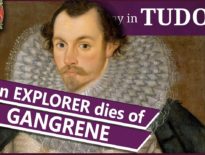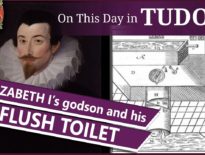On this day in Tudor history, 21st November 1495, churchman, Protestant playwright, historian and Bishop of Ossory, John Bale was born in Suffolk.
Bale wrote twenty-four plays, and a book on famous British writers, which is his most well-known work. His work on Protestant martyrs was also used by the famous martyrologist John Foxe.
John Bale also courted controversy with his attacks on Catholics, and he spent a fair amount of time in exile.
Find out all about this accomplished Tudor man in today's talk.
Also on this day in Tudor history, 21st November 1559, Frances Grey, Duchess of Suffolk and mother of Queen Jane, or Lady Jane Grey, died at Richmond.
Frances, daughter of Charles Brandon, Duke of Suffolk, and Mary Tudor, Queen of France, has gone down in history as rather a harsh and abusive mother, but I told you all about the woman who was once named in Edward VI's "devise for the succession" in last year’s video.
Also on this day in history:
- 1558 – Death of James Bassett, courtier and stepson of Arthur Plantagenet, Viscount Lisle. Bassett was a member of Philip of Spain's Privy Chamber and private Secretary to Mary I. He was buried at Blackfriars, London.
- 1579 – Death of Sir Thomas Gresham, merchant and founder of the Royal Exchange and Gresham College, at Gresham House in Bishopsgate, London. He was buried at St Helen's Church, Bishopsgate.
- 1613 – Death of Rose Throckmorton (née Lok), businesswoman and Protestant exile, at the age of eighty-six. Rose was the daughter of Sir William Lok, mercer and Gentleman Usher of the Chamber to Henry VIII, and in her memoirs she claimed that her father had been responsible for supplying Queen Anne Boleyn with religious books from the Continent.
Transcript:
November 21
On this day in Tudor history, 21st November 1495, churchman, Protestant playwright, historian and Bishop of Ossory, John Bale was born at Cove, near Dunwich, in Suffolk.
Bale wrote twenty-four plays, but his most famous work is his “Illustrium majoris Britanniae scriptorum, hoc est, Angliae, Cambriae, ac Scotiae Summarium...” ("A Summary of the Famous Writers of Great Britain, that is, of England, Wales and Scotland"), which was his effort to record every work by a British author. It is a work I’ve often used in my research on Tudor poets and authors.
Let me tell you a bit more about this accomplished Tudor man…
• John Bale was the son of Henry Bale and his wife, Margaret, who were apparently of humble origins.
• He was educated at Norwich’s Carmelite priory, from the age of 12, before moving on to Jesus College, Cambridge, and then abroad at Louvain and Toulouse.
• He was awarded a Bachelor of Theology from Cambridge in 1529, and then a Doctorate in Theology in around 1531.
• Bale was made prior of the White Friars in Maldon in Essex in 1530, then the Carmelites of Ipswich in 1533, and prior of Doncaster in 1534.
• In the 1530s, Bale converted to Protestantism due to the influence of his patron, East Anglian peer, Thomas, 1st Baron Wentworth of Nettlestead. Bale managed to escape conviction for heresy in 1534 after being charged with it. He had preached against the invocation of saints in a sermon at Doncaster and was hauled before the Archbishop of York.
• In 1536, he left his posts at Doncaster and Ipswich, renounced his vows and married a widow named Dorothy.
• He became a priest at Thorndon in Suffolk in 1536 and a year later he was arrested for heresy after denouncing “papistry” in a sermon he preached. Antiquarian John Leland, who was close to Henry VIII and supported Bale and his work, interceded on his behalf and he was released. Bale was also close to Thomas Cromwell, so that may well have helped his cause too.
• Bale led a troupe of actors who performed allegorical morality plays in support of Protestantism, and this troupe was supported by Cromwell.
• Bale wrote 24 plays, including “Three Laws of Nature, Moses and Christ, corrupted by the Sodomites, Pharisees and Papists most wicked”, “A Tragedy; or interlude manifesting the chief promises of God unto Man”, “The Temptation of our Lord”, “A brief Comedy or Interlude of Johan Baptist’s preaching in the Wilderness, etc” and “King John”. King John was performed at the home of Thomas Cranmer, Archbishop of Canterbury, in 1538, and flattered King Henry VIII for attacking papal tyranny and breaking with Rome.
Several of his plays were composed under Thomas Cromwell’s patronage.
• In 1539, Bale fled into exile abroad with his wife and children following the reversal in Henry VIII’s religious policy and the Act of the Six Articles. On the continent, he wrote a number of anti-Catholic works, examining the treatment of Protestant martyrs, including Anne Askew. These works were used as a source by martyrologist John Foxe.
Bale also used his work to attack Stephen Gardiner, Bishop of Winchester, for his persecution of Protestants, and risked trouble by organising the smuggling of religious tracts to England.
• His major work, “Illustrium majoris Britanniae scriptorum” was published in Wesel in 1548.
• Bale returned to England in Edward VI’s reign, residing at the Duchess of Richmond’s house in London, with John Foxe. In 1551, he was granted the living of Bishopstoke in Hampshire and then made vicar of Swaffham in Norfolk.
• In 1552, King Edward VI made him Bishop of Ossory in Ireland and he was consecrated in Dublin in February 1553, causing controversy by refusing the traditional Catholic rites of consecration. He also had boys act out his morality plays in Kilkenny on Sunday afternoons. However, he did manage to do what John Dudley, Duke of Northumberland, Lord President of Edward VI’s council, wanted him to do – he converted a number of people with his preaching.
• He lived in Kilkenny until the accession of the Catholic Queen Mary I in the summer of 1553 led to him attempting to flee into exile once more. He set sail from Dublin for the Netherlands in September 1553, but was intercepted and taken prisoner on a Dutch man-of-war. The ship had to dock at St Ives in Cornwall due to bad weather and Bale was arrested there, accused of treason, but then released. He was arrested once more at Dover when he tried to leave the country again, but although he was held for several weeks, he managed to pay his way out and was able to travel on to the Continent.
• While in exile, he focused on his writing and, in Frankfurt in September 1554 he took part in the disputations among the Protestant exiles there.
• Bale returned to England after the accession of Elizabeth I and in 1560 he was made a canon of a prebend of Canterbury Cathedral.
• In 1561, he published an attack on Edmund Bonner, the Catholic bishop of London, and in 1563 he attended convocation, However, he was dead by 26th November 1563 and was laid to rest at Canterbury.
• Trivia: for those of you interested in the Boleyns, John Bale wrote of George Boleyn, Lord Rochford, brother of Queen Anne Boleyn, describing his “rythmos elegantissimos” and how he was the author of some of the most elegant poetry of the age.



Leave a Reply